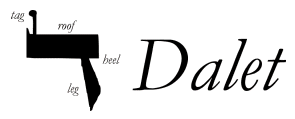|
|
 |
 |
|
Advanced Information
|
 |
 |
 |
 |
|
 |
 |
 |
 |
 |
|
 |
|
|
|
The letter Dalet is the fourth letter of the Aleph-Bet, having the numeric value of four. The pictograph for Dalet looks something like a closed (hanging) tent door, whereas the classical Hebrew script (ketav Ashurit) is constructed of two lines and a corner point (or overhang) called an "ear." The bent shape of the dalet symbolizes a needy person who is bent over (the word Dalet comes from  (dalah) which means to draw out or impoverish, and the word (dalah) which means to draw out or impoverish, and the word  (dalut) means poor or impoverished). Dalet's ear is said to be listening for the gemilut chasidim of the approaching Gimmel. (dalut) means poor or impoverished). Dalet's ear is said to be listening for the gemilut chasidim of the approaching Gimmel.
|
|
|
- Mysteries of Dalet
Dalet represents lowliness and the consciousness of possessing nothing of one's own. As a door Dalet also symbolically represents the choice to open ourselves to the hope of our dreams or to remain closed off and alienated.
The corner point represents the concept of bitul or spiritual self-nullification. Practice of bitul leads to humility, the doorway to God's house, which is attained by the technique known as devekut, cleaving or clinging to God:

- Dalet and the Pardes
Traditional Jewish sages identify four levels of interpretation of the Scriptures, called  (pardes), an acronym formed from: (pardes), an acronym formed from:
 - P'shat (literal meaning based on historical intent of author) - P'shat (literal meaning based on historical intent of author) - Remez (hint, allusion, analogy, allegory) - Remez (hint, allusion, analogy, allegory) - D'rash (application, exposition) - D'rash (application, exposition) - Sod (mystery, "deep" meaning) - Sod (mystery, "deep" meaning)
Indeed the word for knowledge,  (da'at), means the "door on the eye" using the ancient pictographs. (da'at), means the "door on the eye" using the ancient pictographs.
- Dalet and the Torah
There are four letters to the Name of the LORD  , just as there are four components of the text of Torah, including: , just as there are four components of the text of Torah, including:
 - Otiyot (letters). The 22 medial and 5 final forms of the Hebrew consonants. - Otiyot (letters). The 22 medial and 5 final forms of the Hebrew consonants. - Nikudot (vowel marks). The vowel marks added to the text. - Nikudot (vowel marks). The vowel marks added to the text. - Tagin (crowns). The crowned letters for the so-called Sha'atnezgets letters: Shin, 'Ayin, Tet, Nun, Zayin, Gimmel and Tzade. - Tagin (crowns). The crowned letters for the so-called Sha'atnezgets letters: Shin, 'Ayin, Tet, Nun, Zayin, Gimmel and Tzade. - Ta'amim. Cantillation (or trope) marks used for chanting the Torah. - Ta'amim. Cantillation (or trope) marks used for chanting the Torah.
- Dalet and the Names and Titles of God
God is called dayan ha'emet, the True Judge.

Yeshua the Mashiach is indeed the True Judge whom the Father has given all authority over the destinies of mankind.
- Dalet and the Doorway from Judah
Yeshua the Mashiach, of course, was of the tribe of Judah. Interestingly, the name for the tribe  (yehudah) contains every letter of the Sacred Name (yehudah) contains every letter of the Sacred Name  except for the letter Dalet, suggesting that the door to the LORD would come through Judah. except for the letter Dalet, suggesting that the door to the LORD would come through Judah.
- Dalet is a Picture of Humanity in need of Yeshua
The word for religion is  (dat), which means the "door of the cross" using the ancient pictographs. The Father (Aleph) sent His Son (Bet) and by means of the Holy Spirit (Gimmel) who makes appeal to the poor and needy to receive the grace of the LORD God of Israel. As Yeshua said, "Behold, I stand at the door, and knock: if any man hear my voice, and open the door, I will come in to him, and will sup with him, and he with me" (Revelation 3:20). (dat), which means the "door of the cross" using the ancient pictographs. The Father (Aleph) sent His Son (Bet) and by means of the Holy Spirit (Gimmel) who makes appeal to the poor and needy to receive the grace of the LORD God of Israel. As Yeshua said, "Behold, I stand at the door, and knock: if any man hear my voice, and open the door, I will come in to him, and will sup with him, and he with me" (Revelation 3:20).
|
|
|
|
Hebrew for Christians
Copyright © John J. Parsons
All rights reserved.
|
|
|
|
 |
|
|
|
|
|
|









